牛津译林版(2020)必修第三册Unit 4 Scientists who changed the world Grammar and Usage 课件(共51张PPT)
文档属性
| 名称 | 牛津译林版(2020)必修第三册Unit 4 Scientists who changed the world Grammar and Usage 课件(共51张PPT) |
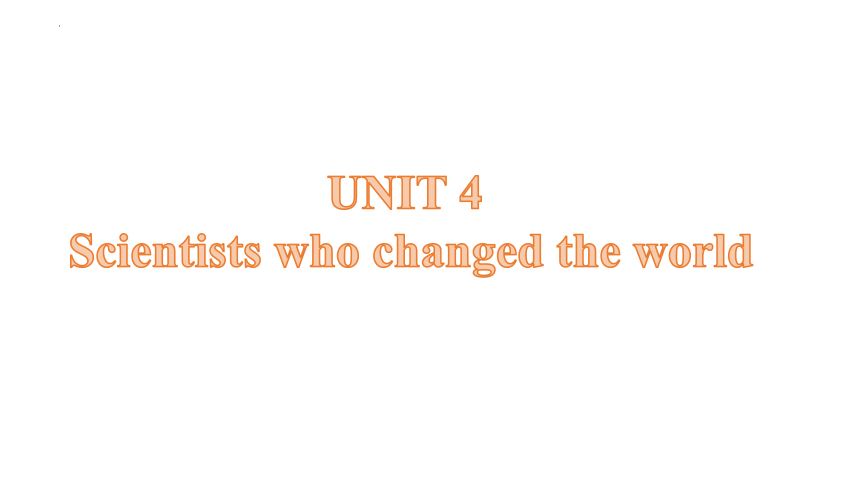
|
|
| 格式 | pptx | ||
| 文件大小 | 3.2MB | ||
| 资源类型 | 教案 | ||
| 版本资源 | 牛津译林版(2019) | ||
| 科目 | 英语 | ||
| 更新时间 | 2023-12-24 10:30:59 | ||
图片预览

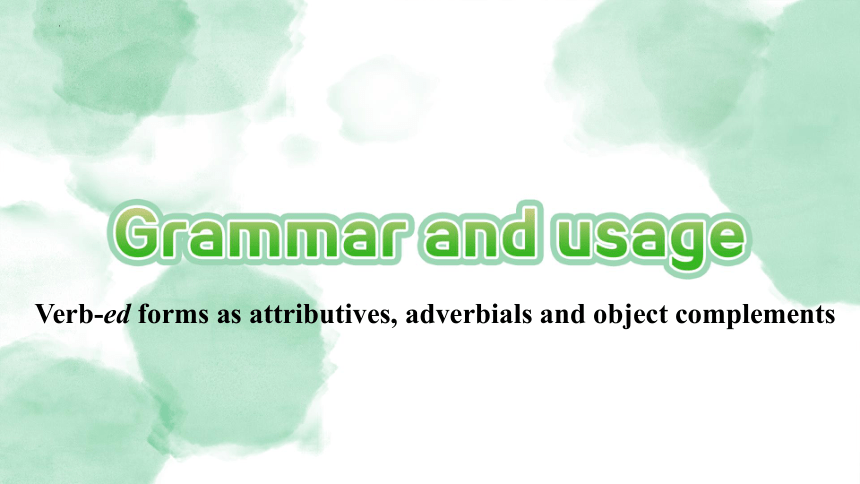
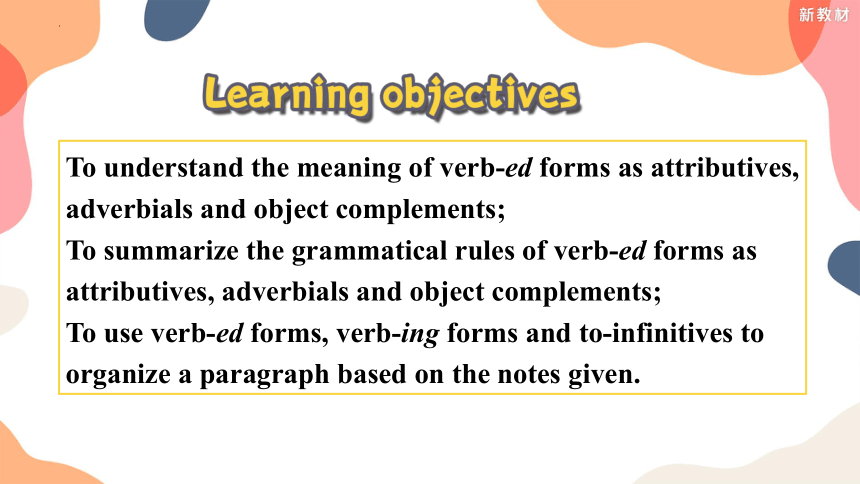
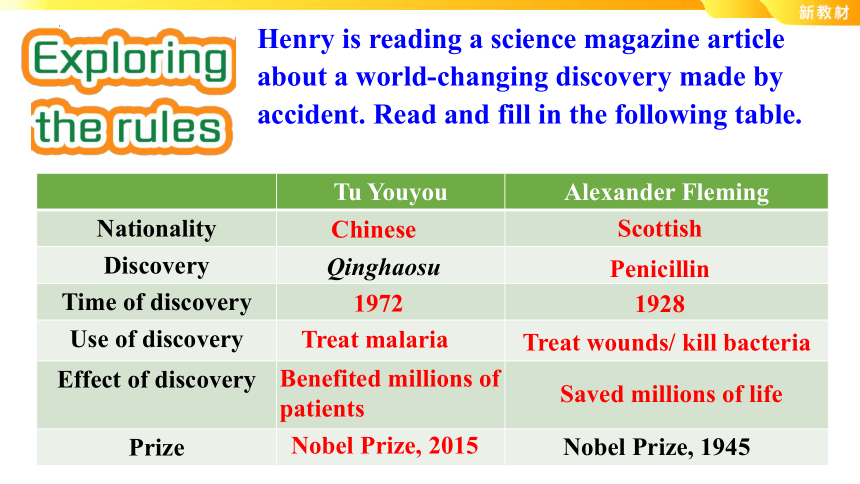
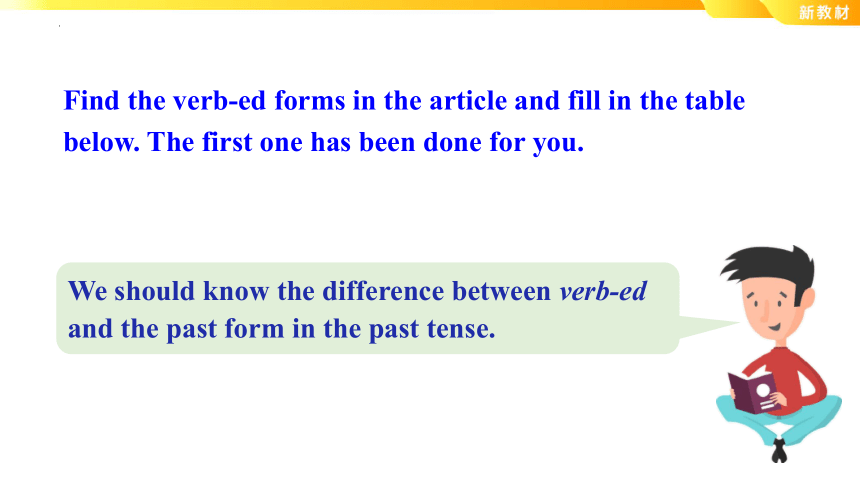
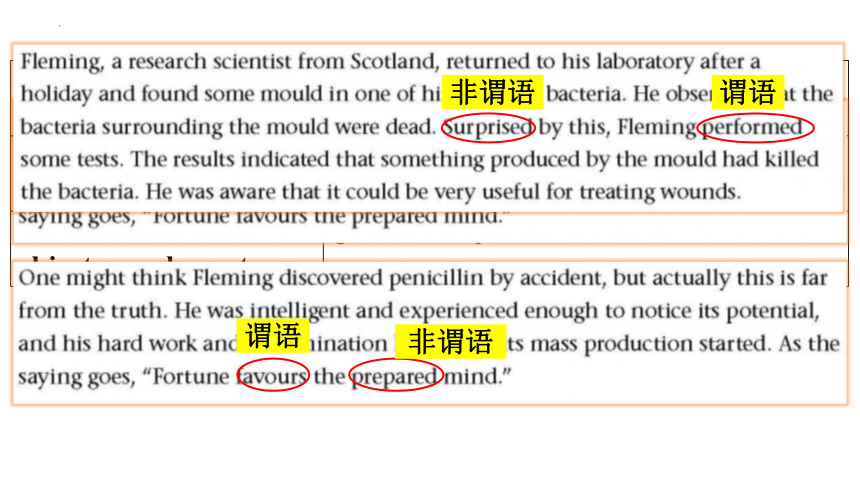
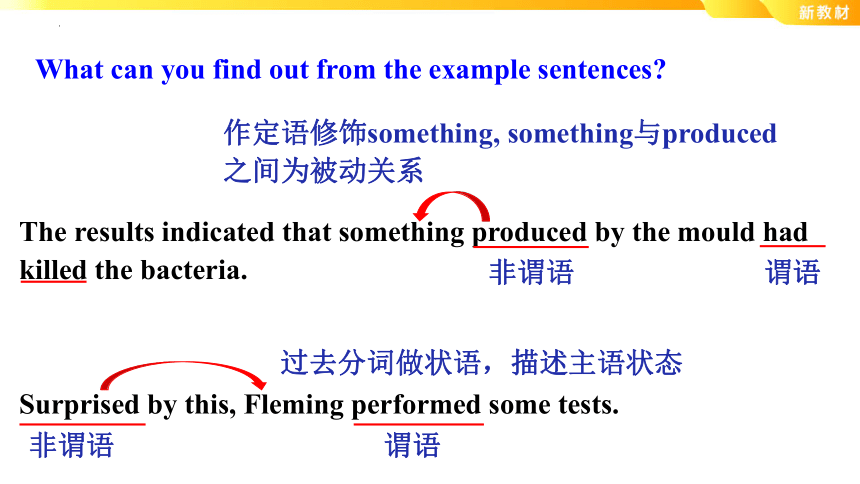
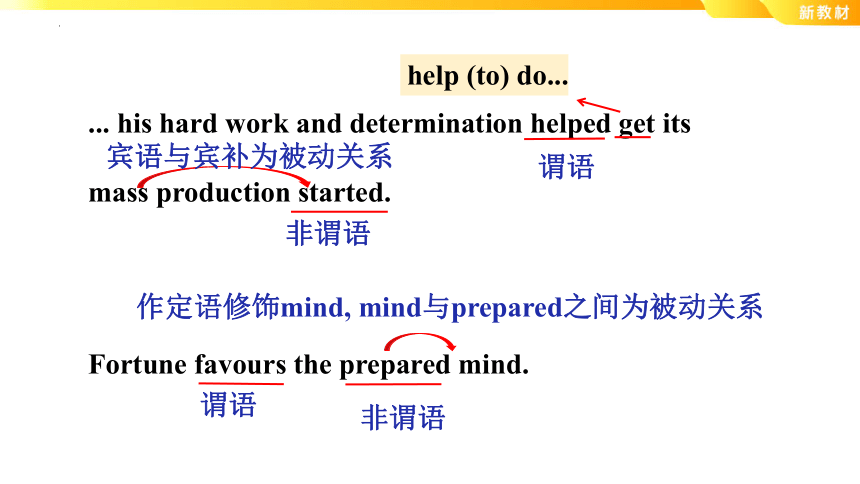
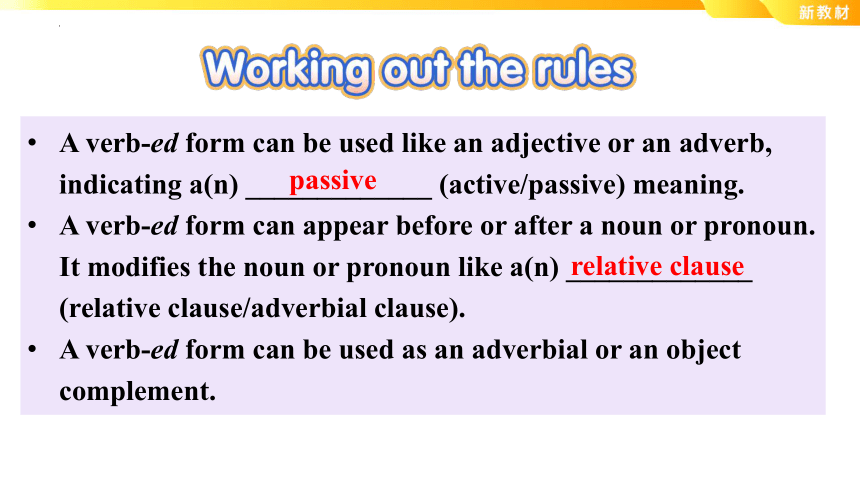
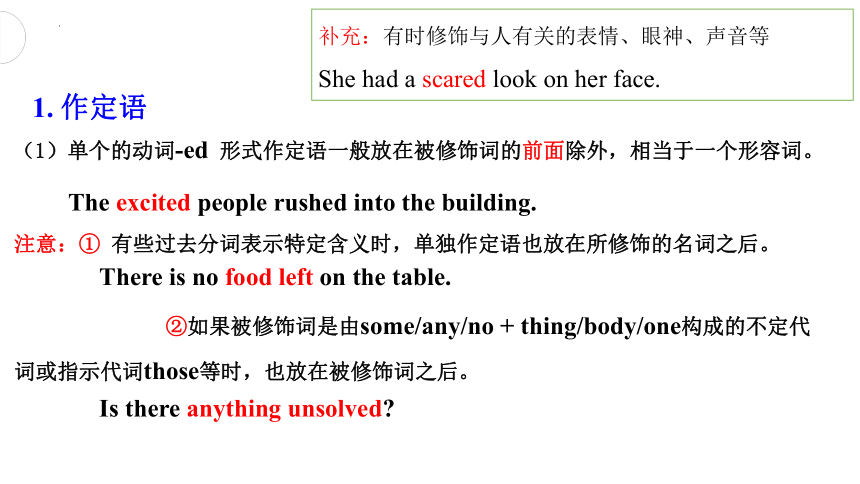
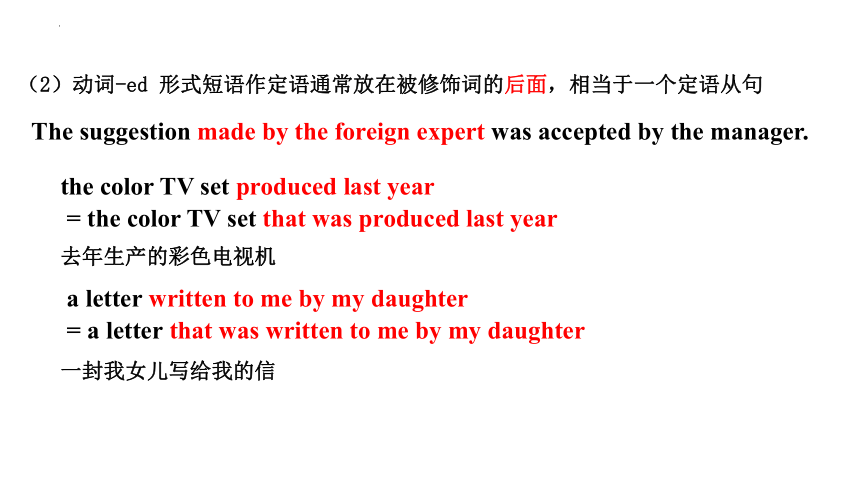
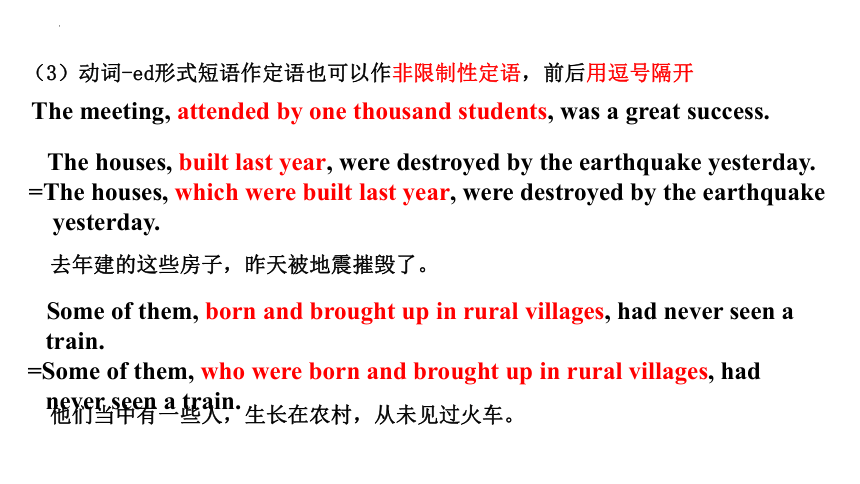
文档简介
(共51张PPT)
UNIT 4
Scientists who changed the world
Verb-ed forms as attributives, adverbials and object complements
To understand the meaning of verb-ed forms as attributives, adverbials and object complements;
To summarize the grammatical rules of verb-ed forms as attributives, adverbials and object complements;
To use verb-ed forms, verb-ing forms and to-infinitives to organize a paragraph based on the notes given.
Henry is reading a science magazine article about a world-changing discovery made by accident. Read and fill in the following table.
Tu Youyou Alexander Fleming
Nationality
Discovery
Time of discovery
Use of discovery
Effect of discovery
Prize
Chinese
Scottish
Qinghaosu
Penicillin
1972
1928
Treat malaria
Treat wounds/ kill bacteria
Benefited millions of patients
Saved millions of life
Nobel Prize, 2015
Nobel Prize, 1945
Find the verb-ed forms in the article and fill in the table below. The first one has been done for you.
We should know the difference between verb-ed and the past form in the past tense.
Verb-ed form as an attributive something produced by the mould
Verb-ed form as an adverbial
Verb-ed form as an object complement
Surprised by this, Fleming performed some tests.
get its mass production started
the prepared mind
谓语
非谓语
谓语
非谓语
谓语
非谓语
The results indicated that something produced by the mould had killed the bacteria.
What can you find out from the example sentences
谓语
非谓语
作定语修饰something, something与produced之间为被动关系
Surprised by this, Fleming performed some tests.
谓语
非谓语
过去分词做状语,描述主语状态
... his hard work and determination helped get its
mass production started.
谓语
非谓语
help (to) do...
宾语与宾补为被动关系
作定语修饰mind, mind与prepared之间为被动关系
Fortune favours the prepared mind.
谓语
非谓语
A verb-ed form can be used like an adjective or an adverb, indicating a(n) _____________ (active/passive) meaning.
A verb-ed form can appear before or after a noun or pronoun. It modifies the noun or pronoun like a(n) _____________ (relative clause/adverbial clause).
A verb-ed form can be used as an adverbial or an object complement.
passive
relative clause
1. 作定语
(1)单个的动词-ed 形式作定语一般放在被修饰词的前面除外,相当于一个形容词。
The excited people rushed into the building.
注意:① 有些过去分词表示特定含义时,单独作定语也放在所修饰的名词之后。
②如果被修饰词是由some/any/no + thing/body/one构成的不定代词或指示代词those等时,也放在被修饰词之后。
There is no food left on the table.
Is there anything unsolved
补充:有时修饰与人有关的表情、眼神、声音等
She had a scared look on her face.
the color TV set produced last year
= the color TV set that was produced last year
a letter written to me by my daughter
= a letter that was written to me by my daughter
一封我女儿写给我的信
去年生产的彩色电视机
(2)动词-ed 形式短语作定语通常放在被修饰词的后面,相当于一个定语从句
The suggestion made by the foreign expert was accepted by the manager.
The houses, built last year, were destroyed by the earthquake yesterday.
=The houses, which were built last year, were destroyed by the earthquake yesterday.
去年建的这些房子,昨天被地震摧毁了。
Some of them, born and brought up in rural villages, had never seen a train.
=Some of them, who were born and brought up in rural villages, had never seen a train.
他们当中有一些人,生长在农村,从未见过火车。
(3)动词-ed形式短语作定语也可以作非限制性定语,前后用逗号隔开
The meeting, attended by one thousand students, was a great success.
1. There was an ________ (excite) look on his face when the actress appeared.
2. It’s wrong for the ___________ (develop) countries to control the world.
3. I have collected all the money _________ (need).
4. This is the problem ___________ (discuss) at the meeting yesterday.
5. The ___________ (surprise) look on his face suggested that he had not expected so.
6. Most of the people__________(invite) to the party are famous scientists.
7.The EMS __________ (post) yesterday will reach my brother in three days.
8. There has been nothing ___________ (change) here since I left this city.
9. She is a ___________ (respect) teacher.
excited
developed
needed
discussed
surprised
invited
posted
changed
respected
Practice
2. 作状语
(1)动词-ed形式作状语时,其逻辑主语通常要与句子
的主语保持一致。
(2)动词-ed形式作状语时,可表示时间、原因、伴随情况等。
e.g. Translated into English, the sentence was found to have an entirely different word order. (时间)
The children, exhausted (疲惫的) by the journey, fell asleep at once. (原因)
The teacup fell down to the ground, broken. (结果)
Considered from this point of view, the question under discussion is of great importance. (条件)
Born of the same parents, he bears no similarity to his brother. (让步)
The young man came into the room, followed by his friends. (伴随)
c. 动词-ed形式(短语)作状语时,前面可以加一个连
词,使动词-ed形式(短语)所表示的时间、让步、条件
等关系更清楚。这类连词包括although, if, once, though, when, while, whenever, unless, as if, even though等。
e.g. When combined with practice, theory becomes easier to learn.
Though warned of the danger, he still went skating on the thin ice.
Unless heated, a body will have no tendency to expand.
3. 作宾语补足语
动词-ed 形式作宾语补足语,其逻辑主语是句子的宾语,宾语与宾语补足语之间是被动关系,常见的动词-ed 形式做宾语补足语的动词有两类:
(1)使役动词 make, get, have, keep, leave 等.
I’ll have my hair cut tomorrow.
Don’t leave those things undone.
注意:①动词-ed形式所表示的动作由他人实施。
②动词-ed形式所表示的动作由句中的主语实施。
He had his money stolen when going shopping.
He likes to have his arms crossed when talking with others.
表示感观、感觉和发觉的动词。如:watch, observe, see, hear, listen to, feel, notice, find等。
① When we got to school, we saw the door locked.
② He found his house broken into when he got back home.
当我们到学校时,我们看见门锁着。
回到家他发现家被盗。
在with的复合结构中也可用动词-ed作宾语补足语。这一结构通常在句中作时间、方式、条件、原因等状语。
① The murderer was brought in, with his hands tied behind his back.
② With water heated, we can see the steam.
③ With the matter settled, we all went home.
凶手被带进来了,他的双手被绑在背后。(表方式)
水一被加热,我们就会看到水蒸气。(表条件)
事情得到解决,我们都回家了。(表原因)
1. Watching the __________ (finishing/finished) painting, Alice couldn't help smiling.
2. Most of the artists __________ (inviting/invited) to the party were from South Africa.
3. Do you still remember the Olympic Games________(held/holding)
in Beijing in 2008
4. The __________ (surprising/surprised) look on her face suggested that she hadn't known the news before.
5. There are many ________ (fallen / falling) leaves on the street.
finished
invited
held
surprised
fallen
6. ____________ (frighten) by the noise outside, Sue dared not sleep in her bedroom.
7. ___________ (compare) with our small flat, Bill's house seemed like a palace.
8. ______ ( face) with such a difficult task, we must redouble our efforts.
9. __________ (order) over a week ago, the books are expected to arrive any time now.
10. The lady returned home, _________ (follow) by the famous detective Holmes.
Frightened
Compared
Faced
followed
Ordered
11. My computer broke down this morning, and I will get it _________ (repair) as soon as possible.
12. We saw the house ________ (burn) to the ground when we got there.
13. When he entered the room, he found the window _________ (break).
14. She won't have her long and beautiful hair _____ (cut) short.
15. The speaker raised her voice but still couldn't make herself _______ (hear).
repaired
burned
broken
cut
heard
【拓展】
4. 表语
动词-ed形式作表语时通常用来表示主语的感受或所处的状态。
e.g. He was very excited when he heard the news.
After a time I grew dissatisfied with the work.
Use the verb-ed forms in the following sentences to fill in the table below.
Verb-ed forms as attributives
Verb-ed forms as adverbials
Verb-ed forms as object complements
Tu Youyou has become the first female scientist of the People’s Republic of China to receive a Nobel Prize, awarded for her contribution to the fight against malaria.
Thanks to her discovery of qinghaosu, malaria patients all over the world now have had a greatly increased chance of survival.
Born in 1930, in Ningbo, Zhejiang Province, Tu studied medicine at university in Beijing between 1951 and 1955.
Verb-ed forms as attributives
Verb-ed forms as adverbials
Verb-ed forms as object complements
1, 2
3
4. Inspired by an over 1,600-year-old text about preparing qinghao extract with cold water, Tu redesigned the experiments and tried extracting the herb at a low temperature in order not to damage its effective part.
5. Even with large amounts of qinghao extract produced, however, they still faced another problem.
Verb-ed forms as attributives
Verb-ed forms as adverbials
Verb-ed forms as object complements
4
5
Rewrite the following sentences using verb-ed forms as attributives, adverbials or object complements.
1 The scientist who has been highly praised won an award.
The highly praised scientist won an award.
2 The experiment that is mentioned in your article is interesting.
The experiment mentioned in your article is interesting.
4 The scientist found that the equipment in the laboratory had been destroyed.
5 Once this report is finished, it will be very useful for future
research.
The scientist found the equipment in the laboratory destroyed.
Once finished, this report will be very useful for future research.
3 The patients soon recovered because they were treated with the new medicine.
Treated with the new medicine, the patients soon recovered.
1 The highly praised scientist won an award.
2 The experiment mentioned in your article is interesting.
3 Treated with the new medicine, the patients soon recovered.
4 The scientist found the equipment in the laboratory destroyed.
5 Once finished, this report will be very useful for future research.
After being rewritten, in sentences _______, the verb-ed forms are used as attributives; in sentences _______, the verb-ed forms are used as adverbials; in sentences _______, the verb-ed form is used as an object complement.
1,2
3,5
4
Henry is reading an article about Franklin's kite plete the article below with the correct verb-ed forms or verb-ing forms.
We should analyze the relationship between the logic subject and the verb to decide whether it is passive or active.
Sometimes, verb-ed can be used as an adjective meaning “……的”; verb-ing can be used as an adjective meaning “令人……的”.
Benjamin Franklin was a famous scientist, writer, printer, inventor and politician. As a scientist, he was well known for his kite experiment. The story goes like this: Franklin had found lightning ___________ (interest) for years, believing it was
actually electricity. He designed an experiment to prove his theory.
He worked out that by flying a kite during a thunderstorm, electricity could go through the wet kite line down to the earth.
interesting
an object complement
________ (know) it was too dangerous to hold the wet line, Franklin held a silk ribbon ________ (tie) to the end of it. He made sure the silk ribbon stayed dry so that the electricity would not go through his body. Then he attached a metal key where the ribbon and kite line joined. When a thunderstorm approached, the lightning would charge the key. ___________ (conduct) on a stormy day in 1752, his experiment proved lightning was really just electricity.
Knowing
tied
Conducted
an adverbial
an attributive
an adverbial
Franklin had his theory _________ (accept) by many people. However, some people questioned whether he had actually done the experiment, __________ (argue) that if he had really done it, he would have received a deadly electric shock. Whatever the truth, Franklin did make contributions to the studies of electricity.
arguing
accepted
Why was Franklin’s experiment questioned
Because many people believed that if he had really done the experiment, he would have received a deadly electric shock.
an object complement
an adverbial
1. They make great gifts and you see them many times ___________ (decorate) with red envelopes and messages of good fortune.
decorated
2. Technological innovations, ______ good marketing, will promote the sales of these products.
A. combined with B. combining with
C. having combined with D. to be combined with
A
1. He observed that the bacteria surrounding the mould were dead.
surround v. to be all around sth./sb. (使)包围, 环绕; 围绕
surround ... with … 用……包围……
be surrounded by/ with sth./ sb.被某物/某人所包围
e.g. Tall trees surround the lake.
The lake is surrounded with/by trees.
【拓展】 surrounding adj. (作定语) 周围的; 附近的
surroundings n. (pl.) 环境(同environment)
【语境应用】用surround的适当形式填空。
1) Lucy was sitting on the floor ____________ by toys.
2) We decided to explore the _____________ countryside.
3) When he came back to life, he found himself
_____________ by his children.
4) It’s important to work in friendly ______________.
surrounded
surrounding
surrounded
surroundings
5) And when he saw the mists rising from the river and the soft clouds ____________ (surround) the mountain tops, he was reduced to tears.
surrounding
2. The results indicated that something produced by the mould
had killed the bacteria.
indicate v. to show that sth is true or exists 表明
indicate sth. to sb. 向某人指示……
indicate that ... 指示……;表明……
e.g. Research indicates that eating habits are changing fast.
【拓展】indication n. 象征; 显示; 标示
There is no indication that... 无迹象表明……
There are some indications that... 有迹象表明……
e.g. There are clear indications that the economy is improving.
3. Fortune favours the prepared mind. (翻译)
幸运眷顾有准备的人。
favour v. to treat sb better than you treat other people, especially in an unfair way 偏袒
to prefer one system, plan, way of doing sth, etc. to another
支持,赞同
to provide suitable conditions for a particular person, group, etc. 有利于,有助于
e.g. The current economy does not favour the development of small businesses.
It remains to be seen if the show will still find favour with a 1990s audience...
【拓展】
favour n. 恩惠; 照顾; 好意; 关心; 支持
do sb. a favour 帮某人忙
ask sb. a favour=ask a favour of sb. 请某人帮忙
win sb.’s favour 得到某人的欢心/好感
in favour of 赞成; 支持
in one’s favour 对某人有利
be in favour (with sb.) 受(某人的)欢迎
【语境应用】完成句子。
1) Could you _______________ and tell Kelly I can’t make it
你帮个忙告诉Kelly说我来不了好吗?
2) My sister was against my suggestion while my brother ______________ (赞成) it.
3) Duncan had his height and weight ___________ (对他有利) during the fight.
do me a favour
was in favour of
in his favour
4. When a thunderstorm approached, the lightning would
charge the key.
charge v. to ask an amount of money for goods or a service 收费
to accuse sb formally of a crime so that there can be a trial in court 控诉
to pass electricity through sth so that it is stored there充电
e.g. The restaurant charged 20 for dinner.
Several people were arrested (逮捕) but nobody was charged.
Before use, the battery must be charged.
【拓展】
charge sb. for 为……向某人收取费用
charge sb. with (doing) sth. = accuse sb. of 控告某人(做)某事
n. 费用; 主管
take charge of 掌管;负责……
in charge of 主管,负责……
in/under the charge of 由……负责
free of charge 免费
【语境应用】完成句子。
1) Your order will be delivered _____________ (免费) within a ten -mile limit.
2) They charged me five dollars ______ a cup of coffee.
3) The project is ________________ (在……掌管之下) an experienced engineer.
4) The man arrested by the police ________________ (被指控) stealing.
was charged with
free of charge
for
in the charge of
1 做测试
2 吸引某人的注意力
3 批量生产
4 偶然;意外地
5 远非,几乎相反
6 使某事被做
7 幸运总是眷顾有准备的人。
perform tests
mass production
far from
get / have sth done
Fortune favours the prepared mind.
Important words & phrases (P48)
catch the attention of sb
by accident
8 故事是这样的。
9 A被系在B上
10 给某物充电
11 保持干爽的
12 受到致命电击
13 为……做贡献
A be tied to B
charge sth
stay dry
receive a deadly electric shock
make contributions to
Important words & phrases (P49)
The story goes like this.
Read the notes below about Alfred Wegener and his theory of continental drift. Then write a short paragraph using verb-ed forms, verb-ing forms and to-infinitives. The beginning has been written for you.
Looking at a world map, Alfred Wegener found
Looked at a world map and found the eastern coastline of South America and the western coastline of Africa could fit together;
Did more research and put forward the theory of continental drift;
Published his ideas in The Origin of Continents and Oceans;
People did not accept his theory partly because:
it challenged many theories at that time;
Wegener could not explain the driving force behind continental drift.
Looking at a world map, Alfred Wegener found something amazing: the eastern coastline of South America and the western coastline of Africa seemed to fit together. He did more research to find out what caused this. Having collected enough evidence, he put forward his theory of continental drift. Then he had his ideas published in The Origin of Continents and Oceans. However, people did not believe in his theory. For one thing, it challenged many scientific theories widely accepted at that time. For another, Wegener failed to explain the driving force causing the continents to drift apart.
1 即将发生(或出现、到来)
2 力求达到;力争做到某事
3 鼓励某人做某事
4 对…感兴趣
5 培养良好的学习方法
6 提交/上交某物(给某人)
7 (以某种方式)发生;开火;爆炸
8 极为成功
come up
Important words & phrases (P50-51)
aim to do sth
encourage sb to do sth
take an interest in
develop good study skills
hand sth in (to sb)
go off
with a bang
9 炫耀;显示
10 创造性才能
show off
Important words & phrases (P50-51)
creative talent
UNIT 4
Scientists who changed the world
Verb-ed forms as attributives, adverbials and object complements
To understand the meaning of verb-ed forms as attributives, adverbials and object complements;
To summarize the grammatical rules of verb-ed forms as attributives, adverbials and object complements;
To use verb-ed forms, verb-ing forms and to-infinitives to organize a paragraph based on the notes given.
Henry is reading a science magazine article about a world-changing discovery made by accident. Read and fill in the following table.
Tu Youyou Alexander Fleming
Nationality
Discovery
Time of discovery
Use of discovery
Effect of discovery
Prize
Chinese
Scottish
Qinghaosu
Penicillin
1972
1928
Treat malaria
Treat wounds/ kill bacteria
Benefited millions of patients
Saved millions of life
Nobel Prize, 2015
Nobel Prize, 1945
Find the verb-ed forms in the article and fill in the table below. The first one has been done for you.
We should know the difference between verb-ed and the past form in the past tense.
Verb-ed form as an attributive something produced by the mould
Verb-ed form as an adverbial
Verb-ed form as an object complement
Surprised by this, Fleming performed some tests.
get its mass production started
the prepared mind
谓语
非谓语
谓语
非谓语
谓语
非谓语
The results indicated that something produced by the mould had killed the bacteria.
What can you find out from the example sentences
谓语
非谓语
作定语修饰something, something与produced之间为被动关系
Surprised by this, Fleming performed some tests.
谓语
非谓语
过去分词做状语,描述主语状态
... his hard work and determination helped get its
mass production started.
谓语
非谓语
help (to) do...
宾语与宾补为被动关系
作定语修饰mind, mind与prepared之间为被动关系
Fortune favours the prepared mind.
谓语
非谓语
A verb-ed form can be used like an adjective or an adverb, indicating a(n) _____________ (active/passive) meaning.
A verb-ed form can appear before or after a noun or pronoun. It modifies the noun or pronoun like a(n) _____________ (relative clause/adverbial clause).
A verb-ed form can be used as an adverbial or an object complement.
passive
relative clause
1. 作定语
(1)单个的动词-ed 形式作定语一般放在被修饰词的前面除外,相当于一个形容词。
The excited people rushed into the building.
注意:① 有些过去分词表示特定含义时,单独作定语也放在所修饰的名词之后。
②如果被修饰词是由some/any/no + thing/body/one构成的不定代词或指示代词those等时,也放在被修饰词之后。
There is no food left on the table.
Is there anything unsolved
补充:有时修饰与人有关的表情、眼神、声音等
She had a scared look on her face.
the color TV set produced last year
= the color TV set that was produced last year
a letter written to me by my daughter
= a letter that was written to me by my daughter
一封我女儿写给我的信
去年生产的彩色电视机
(2)动词-ed 形式短语作定语通常放在被修饰词的后面,相当于一个定语从句
The suggestion made by the foreign expert was accepted by the manager.
The houses, built last year, were destroyed by the earthquake yesterday.
=The houses, which were built last year, were destroyed by the earthquake yesterday.
去年建的这些房子,昨天被地震摧毁了。
Some of them, born and brought up in rural villages, had never seen a train.
=Some of them, who were born and brought up in rural villages, had never seen a train.
他们当中有一些人,生长在农村,从未见过火车。
(3)动词-ed形式短语作定语也可以作非限制性定语,前后用逗号隔开
The meeting, attended by one thousand students, was a great success.
1. There was an ________ (excite) look on his face when the actress appeared.
2. It’s wrong for the ___________ (develop) countries to control the world.
3. I have collected all the money _________ (need).
4. This is the problem ___________ (discuss) at the meeting yesterday.
5. The ___________ (surprise) look on his face suggested that he had not expected so.
6. Most of the people__________(invite) to the party are famous scientists.
7.The EMS __________ (post) yesterday will reach my brother in three days.
8. There has been nothing ___________ (change) here since I left this city.
9. She is a ___________ (respect) teacher.
excited
developed
needed
discussed
surprised
invited
posted
changed
respected
Practice
2. 作状语
(1)动词-ed形式作状语时,其逻辑主语通常要与句子
的主语保持一致。
(2)动词-ed形式作状语时,可表示时间、原因、伴随情况等。
e.g. Translated into English, the sentence was found to have an entirely different word order. (时间)
The children, exhausted (疲惫的) by the journey, fell asleep at once. (原因)
The teacup fell down to the ground, broken. (结果)
Considered from this point of view, the question under discussion is of great importance. (条件)
Born of the same parents, he bears no similarity to his brother. (让步)
The young man came into the room, followed by his friends. (伴随)
c. 动词-ed形式(短语)作状语时,前面可以加一个连
词,使动词-ed形式(短语)所表示的时间、让步、条件
等关系更清楚。这类连词包括although, if, once, though, when, while, whenever, unless, as if, even though等。
e.g. When combined with practice, theory becomes easier to learn.
Though warned of the danger, he still went skating on the thin ice.
Unless heated, a body will have no tendency to expand.
3. 作宾语补足语
动词-ed 形式作宾语补足语,其逻辑主语是句子的宾语,宾语与宾语补足语之间是被动关系,常见的动词-ed 形式做宾语补足语的动词有两类:
(1)使役动词 make, get, have, keep, leave 等.
I’ll have my hair cut tomorrow.
Don’t leave those things undone.
注意:①动词-ed形式所表示的动作由他人实施。
②动词-ed形式所表示的动作由句中的主语实施。
He had his money stolen when going shopping.
He likes to have his arms crossed when talking with others.
表示感观、感觉和发觉的动词。如:watch, observe, see, hear, listen to, feel, notice, find等。
① When we got to school, we saw the door locked.
② He found his house broken into when he got back home.
当我们到学校时,我们看见门锁着。
回到家他发现家被盗。
在with的复合结构中也可用动词-ed作宾语补足语。这一结构通常在句中作时间、方式、条件、原因等状语。
① The murderer was brought in, with his hands tied behind his back.
② With water heated, we can see the steam.
③ With the matter settled, we all went home.
凶手被带进来了,他的双手被绑在背后。(表方式)
水一被加热,我们就会看到水蒸气。(表条件)
事情得到解决,我们都回家了。(表原因)
1. Watching the __________ (finishing/finished) painting, Alice couldn't help smiling.
2. Most of the artists __________ (inviting/invited) to the party were from South Africa.
3. Do you still remember the Olympic Games________(held/holding)
in Beijing in 2008
4. The __________ (surprising/surprised) look on her face suggested that she hadn't known the news before.
5. There are many ________ (fallen / falling) leaves on the street.
finished
invited
held
surprised
fallen
6. ____________ (frighten) by the noise outside, Sue dared not sleep in her bedroom.
7. ___________ (compare) with our small flat, Bill's house seemed like a palace.
8. ______ ( face) with such a difficult task, we must redouble our efforts.
9. __________ (order) over a week ago, the books are expected to arrive any time now.
10. The lady returned home, _________ (follow) by the famous detective Holmes.
Frightened
Compared
Faced
followed
Ordered
11. My computer broke down this morning, and I will get it _________ (repair) as soon as possible.
12. We saw the house ________ (burn) to the ground when we got there.
13. When he entered the room, he found the window _________ (break).
14. She won't have her long and beautiful hair _____ (cut) short.
15. The speaker raised her voice but still couldn't make herself _______ (hear).
repaired
burned
broken
cut
heard
【拓展】
4. 表语
动词-ed形式作表语时通常用来表示主语的感受或所处的状态。
e.g. He was very excited when he heard the news.
After a time I grew dissatisfied with the work.
Use the verb-ed forms in the following sentences to fill in the table below.
Verb-ed forms as attributives
Verb-ed forms as adverbials
Verb-ed forms as object complements
Tu Youyou has become the first female scientist of the People’s Republic of China to receive a Nobel Prize, awarded for her contribution to the fight against malaria.
Thanks to her discovery of qinghaosu, malaria patients all over the world now have had a greatly increased chance of survival.
Born in 1930, in Ningbo, Zhejiang Province, Tu studied medicine at university in Beijing between 1951 and 1955.
Verb-ed forms as attributives
Verb-ed forms as adverbials
Verb-ed forms as object complements
1, 2
3
4. Inspired by an over 1,600-year-old text about preparing qinghao extract with cold water, Tu redesigned the experiments and tried extracting the herb at a low temperature in order not to damage its effective part.
5. Even with large amounts of qinghao extract produced, however, they still faced another problem.
Verb-ed forms as attributives
Verb-ed forms as adverbials
Verb-ed forms as object complements
4
5
Rewrite the following sentences using verb-ed forms as attributives, adverbials or object complements.
1 The scientist who has been highly praised won an award.
The highly praised scientist won an award.
2 The experiment that is mentioned in your article is interesting.
The experiment mentioned in your article is interesting.
4 The scientist found that the equipment in the laboratory had been destroyed.
5 Once this report is finished, it will be very useful for future
research.
The scientist found the equipment in the laboratory destroyed.
Once finished, this report will be very useful for future research.
3 The patients soon recovered because they were treated with the new medicine.
Treated with the new medicine, the patients soon recovered.
1 The highly praised scientist won an award.
2 The experiment mentioned in your article is interesting.
3 Treated with the new medicine, the patients soon recovered.
4 The scientist found the equipment in the laboratory destroyed.
5 Once finished, this report will be very useful for future research.
After being rewritten, in sentences _______, the verb-ed forms are used as attributives; in sentences _______, the verb-ed forms are used as adverbials; in sentences _______, the verb-ed form is used as an object complement.
1,2
3,5
4
Henry is reading an article about Franklin's kite plete the article below with the correct verb-ed forms or verb-ing forms.
We should analyze the relationship between the logic subject and the verb to decide whether it is passive or active.
Sometimes, verb-ed can be used as an adjective meaning “……的”; verb-ing can be used as an adjective meaning “令人……的”.
Benjamin Franklin was a famous scientist, writer, printer, inventor and politician. As a scientist, he was well known for his kite experiment. The story goes like this: Franklin had found lightning ___________ (interest) for years, believing it was
actually electricity. He designed an experiment to prove his theory.
He worked out that by flying a kite during a thunderstorm, electricity could go through the wet kite line down to the earth.
interesting
an object complement
________ (know) it was too dangerous to hold the wet line, Franklin held a silk ribbon ________ (tie) to the end of it. He made sure the silk ribbon stayed dry so that the electricity would not go through his body. Then he attached a metal key where the ribbon and kite line joined. When a thunderstorm approached, the lightning would charge the key. ___________ (conduct) on a stormy day in 1752, his experiment proved lightning was really just electricity.
Knowing
tied
Conducted
an adverbial
an attributive
an adverbial
Franklin had his theory _________ (accept) by many people. However, some people questioned whether he had actually done the experiment, __________ (argue) that if he had really done it, he would have received a deadly electric shock. Whatever the truth, Franklin did make contributions to the studies of electricity.
arguing
accepted
Why was Franklin’s experiment questioned
Because many people believed that if he had really done the experiment, he would have received a deadly electric shock.
an object complement
an adverbial
1. They make great gifts and you see them many times ___________ (decorate) with red envelopes and messages of good fortune.
decorated
2. Technological innovations, ______ good marketing, will promote the sales of these products.
A. combined with B. combining with
C. having combined with D. to be combined with
A
1. He observed that the bacteria surrounding the mould were dead.
surround v. to be all around sth./sb. (使)包围, 环绕; 围绕
surround ... with … 用……包围……
be surrounded by/ with sth./ sb.被某物/某人所包围
e.g. Tall trees surround the lake.
The lake is surrounded with/by trees.
【拓展】 surrounding adj. (作定语) 周围的; 附近的
surroundings n. (pl.) 环境(同environment)
【语境应用】用surround的适当形式填空。
1) Lucy was sitting on the floor ____________ by toys.
2) We decided to explore the _____________ countryside.
3) When he came back to life, he found himself
_____________ by his children.
4) It’s important to work in friendly ______________.
surrounded
surrounding
surrounded
surroundings
5) And when he saw the mists rising from the river and the soft clouds ____________ (surround) the mountain tops, he was reduced to tears.
surrounding
2. The results indicated that something produced by the mould
had killed the bacteria.
indicate v. to show that sth is true or exists 表明
indicate sth. to sb. 向某人指示……
indicate that ... 指示……;表明……
e.g. Research indicates that eating habits are changing fast.
【拓展】indication n. 象征; 显示; 标示
There is no indication that... 无迹象表明……
There are some indications that... 有迹象表明……
e.g. There are clear indications that the economy is improving.
3. Fortune favours the prepared mind. (翻译)
幸运眷顾有准备的人。
favour v. to treat sb better than you treat other people, especially in an unfair way 偏袒
to prefer one system, plan, way of doing sth, etc. to another
支持,赞同
to provide suitable conditions for a particular person, group, etc. 有利于,有助于
e.g. The current economy does not favour the development of small businesses.
It remains to be seen if the show will still find favour with a 1990s audience...
【拓展】
favour n. 恩惠; 照顾; 好意; 关心; 支持
do sb. a favour 帮某人忙
ask sb. a favour=ask a favour of sb. 请某人帮忙
win sb.’s favour 得到某人的欢心/好感
in favour of 赞成; 支持
in one’s favour 对某人有利
be in favour (with sb.) 受(某人的)欢迎
【语境应用】完成句子。
1) Could you _______________ and tell Kelly I can’t make it
你帮个忙告诉Kelly说我来不了好吗?
2) My sister was against my suggestion while my brother ______________ (赞成) it.
3) Duncan had his height and weight ___________ (对他有利) during the fight.
do me a favour
was in favour of
in his favour
4. When a thunderstorm approached, the lightning would
charge the key.
charge v. to ask an amount of money for goods or a service 收费
to accuse sb formally of a crime so that there can be a trial in court 控诉
to pass electricity through sth so that it is stored there充电
e.g. The restaurant charged 20 for dinner.
Several people were arrested (逮捕) but nobody was charged.
Before use, the battery must be charged.
【拓展】
charge sb. for 为……向某人收取费用
charge sb. with (doing) sth. = accuse sb. of 控告某人(做)某事
n. 费用; 主管
take charge of 掌管;负责……
in charge of 主管,负责……
in/under the charge of 由……负责
free of charge 免费
【语境应用】完成句子。
1) Your order will be delivered _____________ (免费) within a ten -mile limit.
2) They charged me five dollars ______ a cup of coffee.
3) The project is ________________ (在……掌管之下) an experienced engineer.
4) The man arrested by the police ________________ (被指控) stealing.
was charged with
free of charge
for
in the charge of
1 做测试
2 吸引某人的注意力
3 批量生产
4 偶然;意外地
5 远非,几乎相反
6 使某事被做
7 幸运总是眷顾有准备的人。
perform tests
mass production
far from
get / have sth done
Fortune favours the prepared mind.
Important words & phrases (P48)
catch the attention of sb
by accident
8 故事是这样的。
9 A被系在B上
10 给某物充电
11 保持干爽的
12 受到致命电击
13 为……做贡献
A be tied to B
charge sth
stay dry
receive a deadly electric shock
make contributions to
Important words & phrases (P49)
The story goes like this.
Read the notes below about Alfred Wegener and his theory of continental drift. Then write a short paragraph using verb-ed forms, verb-ing forms and to-infinitives. The beginning has been written for you.
Looking at a world map, Alfred Wegener found
Looked at a world map and found the eastern coastline of South America and the western coastline of Africa could fit together;
Did more research and put forward the theory of continental drift;
Published his ideas in The Origin of Continents and Oceans;
People did not accept his theory partly because:
it challenged many theories at that time;
Wegener could not explain the driving force behind continental drift.
Looking at a world map, Alfred Wegener found something amazing: the eastern coastline of South America and the western coastline of Africa seemed to fit together. He did more research to find out what caused this. Having collected enough evidence, he put forward his theory of continental drift. Then he had his ideas published in The Origin of Continents and Oceans. However, people did not believe in his theory. For one thing, it challenged many scientific theories widely accepted at that time. For another, Wegener failed to explain the driving force causing the continents to drift apart.
1 即将发生(或出现、到来)
2 力求达到;力争做到某事
3 鼓励某人做某事
4 对…感兴趣
5 培养良好的学习方法
6 提交/上交某物(给某人)
7 (以某种方式)发生;开火;爆炸
8 极为成功
come up
Important words & phrases (P50-51)
aim to do sth
encourage sb to do sth
take an interest in
develop good study skills
hand sth in (to sb)
go off
with a bang
9 炫耀;显示
10 创造性才能
show off
Important words & phrases (P50-51)
creative talent
同课章节目录
- Unit 1 Nature in the balance
- Welcome to the unit
- Reading
- Grammar and usage
- Integrated skills
- Extended reading
- Project
- Unit 2 Natural disasters
- Welcome to the unit
- Reading
- Grammar and usage
- Integrated skills
- Extended reading
- Project
- Unit 3 The world online
- Welcome to the unit
- Reading
- Grammar and usage
- Integrated skills
- Extended reading
- Project
- Unit 4 Scientists who changed the world
- Welcome to the unit
- Reading
- Grammar and usage
- Integrated skills
- Extended reading
- Project
